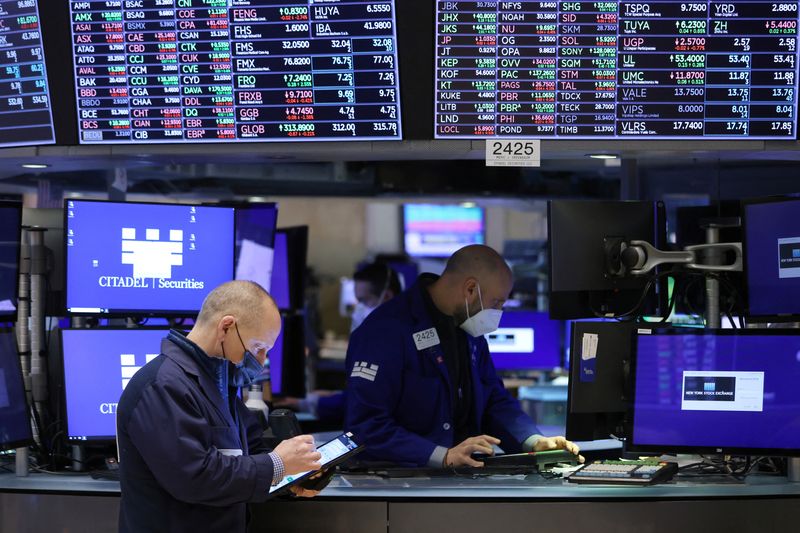By Geoffrey Smith
Investing.com -- Commodity prices surged again and the ruble hit new lows as Western sanctions made it ever harder to deal with Russia. The Kremlin's forces continue to make battlefield gains. Jobless claims and factory orders data are due, while Eurozone producer price inflation hits a massive 30.6%. Snowflake stock tanks after weak guidance, while Broadcom (NASDAQ:AVGO) and Costco (NASDAQ:COST) report after the bell. Here's what you need to know in financial markets on Thursday, 3rd March.
1. Commodity prices surge again
Commodity prices surged again as the threat to Russian supplies of oil, gas, wheat and industrial metals continued to stoke panic buying of alternatives.
U.S. crude futures surged to as high as $116.50 a barrel, their highest since 2008, before retreating to $113.31 by 6:15 AM ET (1115 GMT), a gain of 2.5% on the day. Brent rose 1.9%% to $115.08 a barrel.
In a stark illustration of what is a de facto tightening of the global market, Russian oil major Surgutneftegaz found no buyers for April exports averaging over 200,000 barrels a day at a tender on Wednesday. At the same time, U.S. inventory data showed that stockpiles at the Cushing hub fell to their lowest since 2018, while the Strategic Petroleum Reserve fell to its lowest level since 2002 – even before the measures announced earlier this week to release more oil in the coming days.
Elsewhere, Asian coal and European natural gas futures hit fresh highs, while U.S. wheat futures rose another 4.2%. They’ve now risen over 90% since July. Russia and Ukraine account for some 28% of world wheat exports, an even greater weight than Russia has in world energy markets.
2. Ruble hits new lows; Russian debt cut to junk; battlefield gains continue
The Russian ruble plumbed new depths after the central bank asked foreign exchange brokerages to charge a 30% commission on any sales of dollars, the latest in an increasingly desperate suite of measures to stabilize the local economy. On Wednesday, it had forbidden the payment of interest on domestic government debt held by foreigners.
Overnight, ratings agencies Moody’s and Fitch cut their Russian sovereign debt rating to junk status, while MSCI and Russell said they will cut Russian equities from all of their indices.
EU Commission President Ursula von der Leyen said the EU is willing to consider tighter sanctions if the situation deteriorates. That reflects a growing awareness that the loopholes left by the first round of sanctions last week still allows massive hard currency flows to Russia on a daily basis.
In Ukraine, Russian forces appear to have captured the southern city of Kherson and continue to pound Kharkiv, the country’s second city, with indiscriminate rocket attacks. Russia’s Foreign Ministry talked up the possibility of peace talks with Ukraine later today.
3. Stocks set to open a little lower; Powell to continue testimony
U.S. stock markets are set to open lower later, giving up some of the gains they made on Wednesday on hints from Federal Reserve chairman Jerome Powell that the central bank may not raise interest rates as far as previously thought, given the likely hit to global growth from Russia’s invasion of Ukraine.
Powell continues his semiannual Congressional testimony in the Senate from 10 AM ET.
By 6:15 AM ET, Dow Jones futures were down 39 points, or 0.1%, while S&P 500 futures were down 0.2% and Nasdaq 100 futures were down 0.4%. The three cash indices had gained between 1.6% and 1.9% each on Wednesday.
Stocks likely to be in focus later include software company Snowflake, which fell over 20% after hours on Wednesday after predicting a slowdown in growth this year, and Splunk (NASDAQ:SPLK), which announced a new CEO late Wednesday.
4. Flight from Russia continues; VW, H&M stop operations; Yachts seized
International companies continue to distance themselves from Russia in the wake of the invasion, which was condemned by a large majority in a non-binding motion by the UN General Assembly on Wednesday (albeit China and India abstained).
Volkswagen (DE:VOWG_p) became the latest to say it will stop production in Russia, while fast-fashion giant H&M and IKEA also said they would suspend operations there. Toyota and GM, which don’t produce in Russia, have said they will stop exports there, as has Mercedes-Benz.
Moves to seize the assets of oligarchs linked to the Russian regime are also gathering pace: French authorities seized a yacht belonging to Igor Sechin, the CEO of oil giant Rosneft, while their German counterparts seized a yacht belonging to metals and telecoms billionaire Alisher Usmanov. The U.K. government instructed one of its senior ministers, Michael Gove, to accelerate efforts to freeze Russian assets in Britain.
5. Jobless claims, Challenger job cuts due; euro sinks as PPI rips higher
Away from the war, the regular rhythms of the economic calendar throw up the weekly U.S. jobless claims numbers and the monthly Challenger Job Cuts survey. There are also data due on factory orders and the final version of the ISM’s non-manufacturing survey for February.
Parallel surveys in the Eurozone led to a slight downward revision of flash estimates earlier. Meanwhile, the Eurozone’s annual rate of producer price inflation soared even more than expected to 30.6% after a 5.2% rise in prices in February. That sits ill with ECB comments about the possible need to normalize policy more slowly due to the invasion of Ukraine. The euro fell to a 22-month low of $1.1071.
